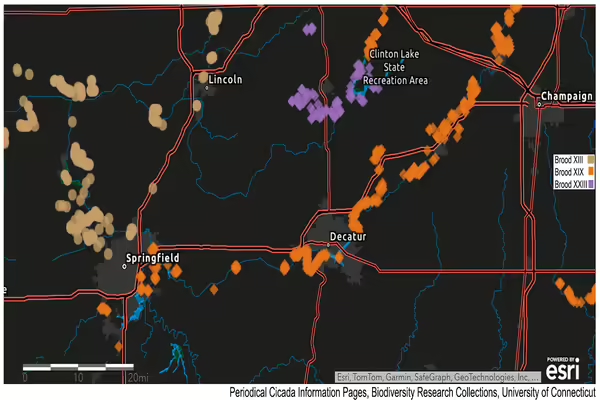
DECATUR, Ill. — This year, not one but two broods- the 13-year Brood XIX and the 17-year Brood XIII- of periodical cicadas will emerge. But, what does this mean for Central Illinois?
The 13-year Brood XIX has been quietly feeding on tree roots for over a decade and will soon make their grand entrance. These cicadas will emerge along the Sangamon River and its major streams stretching from Riverton eastward to north of Fisher, Illinois. Decatur's east and south sides will also buzz with cicada activity. In the Springfield area, the 13-year Brood XIX will impact areas along the Sangamon River to the east and south. However, the north and west regions will likely witness the 17-year Brood XIII.
Who will be affected? The short answer is not everyone. Periodical cicadas prefer woodlands and forests along rivers and tributaries. They can fly no more than 164 feet at a time and only do so for mating and egg-laying. So, cicadas will not venture far from their emergence sites.
Female cicadas are particular where they lay their eggs. They carve grooves into small diameter twigs, which can lead to “flagging” or twig breakage. Flagging will not harm mature trees but can affect newly planted ones. Large, robust trees can withstand egg-laying without long-term damage.
Insecticides are not a recommended method for managing periodical cicadas. Instead, homeowners are encouraged to place netting with small openings (less than ¼ inch) around young saplings and secure the netting at the base of the trunk. Cicadas are harmless to humans and pets; they do not bite or sting but will provide a feast for birds and other wildlife.
For more information about this natural phenomenon, please contact Illinois Extension Educator Doug Gucker at 217-877-6042 or dgucker@illinois.edu
Illinois Extension leads public outreach for University of Illinois by translating research into action plans that allow Illinois families, businesses, and community leaders to solve problems, make informed decisions, and adapt to changes and opportunities. Illinois Extension is part of the University of Illinois Urbana-Champaign College of Agricultural, Consumer and Environmental Sciences.